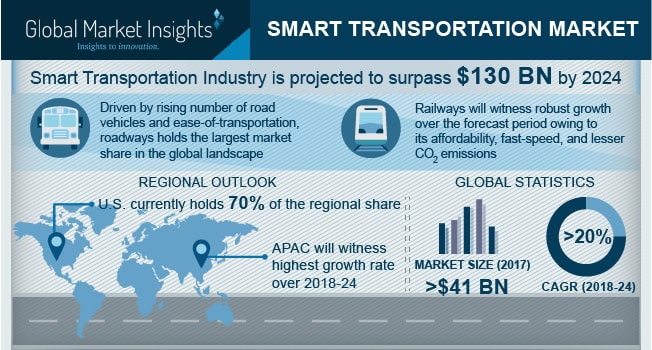Proactive government initiatives forecast to propel smart transportation market in next six years
- Like
- Digg
- Del
- Tumblr
- VKontakte
- Buffer
- Love This
- Odnoklassniki
- Meneame
- Blogger
- Amazon
- Yahoo Mail
- Gmail
- AOL
- Newsvine
- HackerNews
- Evernote
- MySpace
- Mail.ru
- Viadeo
- Line
- Comments
- Yummly
- SMS
- Viber
- Telegram
- Subscribe
- Skype
- Facebook Messenger
- Kakao
- LiveJournal
- Yammer
- Edgar
- Fintel
- Mix
- Instapaper
- Copy Link
Posted: 11 July 2018 | Intelligent Transport | No comments yet
Owing to the extensive and swift adoption of intelligent mobility solutions across major cities around the globe, the smart transportation market has been experiencing lucrative growth in recent years; but more is yet to come.


In addition to the emergence of mart technologies, a remarkable increase in governmental patronage and financial support for revamping the transportation industry – and developing smart cities – can be credited for the rapid progression of this business space. It is currently projected that the smart transportation industry, which surpassed a total remuneration portfolio of about USD 41 billion in 2017, will establish itself as one of most profitable business verticals in the future.
Smart cities and smart transport in India
Recently, the Government of India has announced plans to construct 599 highway projects across the country under its ambitious Smart Cities programme. With a total budgetary outlay of INR 108,000 crore, to be spent over a five-year period, the project has already received INR 50,802 crore and an additional sum of INR 48,000 crore would go toward developing the first 20 smart cities. The main aim of the scheme is to establish an efficient urban mobility and public transport system, which will significantly bolster the growth prospects of the nation’s industry.
In addition, the Indian Government has formulated the National Electric Mobility Mission Plan 2020, which proposes to incentivise the adoption of green vehicles and ramp up the domestic manufacturing capability of its automotive sector. This would necessitate rapid adoption of intelligent traffic management and integrated multimodal transport solutions that would ultimately influence the market expansion.
Dubai: taking the lead with smart transportation
Building on the legacy of innovative initiatives, Dubai has recently announced a partnership with the U.S.-based transportation solutions provider, Hyperloop One, Inc. The objective of this alliance is to harness the prowess of groundbreaking transport technologies, transform the conventional idea of mobility, and assist Dubai in reinforcing its reputation as the chief hub of global trade and tourism.
In addition, the Roads and Transport Authority (RTA) of Dubai has recently declared a new smart transport strategy 2017-2021, which plans to make 25 per cent of the city’s road trips by autonomous vehicles by 2030. The initiative also aims to execute 34 projects ranging from self-driving buses, autonomous drones, and taxis as well as other tasks such as expansion of information kiosks and pedestrian crossings. With the unveiling of such groundbreaking projects, the industry share is bound to advance apace over the ensuing years.
China: Key contributor to industry growth
Touted as the largest automobile market in the world, China has made swift headway enhancing the overall growth potential of industry in recent years. For instance, the Intelligent Transport System Association of China has recently announced plans to invest approximately USD 30 billion in the intelligent transport solutions sector by 2020 to aid the encouragement of green transport and help construct electronic charging systems across the country.
On similar lines, the Chinese Government also aims to have 10 per cent of all cars be self-driving by 2030. Market players welcome this opportunity and intend to release unique solutions that would assist in delivering better traffic updates, on-the-go recharging of electric-vehicle batteries, more accurate mapping, etc. One of the most interesting instances of this is the trial of ‘intelligent highway’ that could revolutionise the global smart transportation market outlook. The idea is to embed advanced technologies and solar panels underneath the highway to generate enough electricity to power approximately 800 homes and highway lights.


Apart from such proactive schemes, China has established a national motor vehicle and driver information management system and further plans to set up a platform for national electronic charging systems. There are also various efforts afoot to promote information-sharing activities between civil aviation, rail, and buses, which would achieve seamless integration of data, in turn opening up a plethora of opportunities for industry stakeholders.
Owing to the development of autonomous vehicles and the penetration of ride-hailing services, the smart transportation market is set to undergo a massive transformation in the forthcoming years. As per a research report compiled by Global Market Insights, Inc., the overall smart transportation industry is forecast to achieve a year-over-year growth rate of an impressive 20 per cent over 2018-2024.
Source: https://www.fractovia.org/news/industry-research-report/smart-transportation-market
Related topics
Intelligent Transport Systems (ITS)







